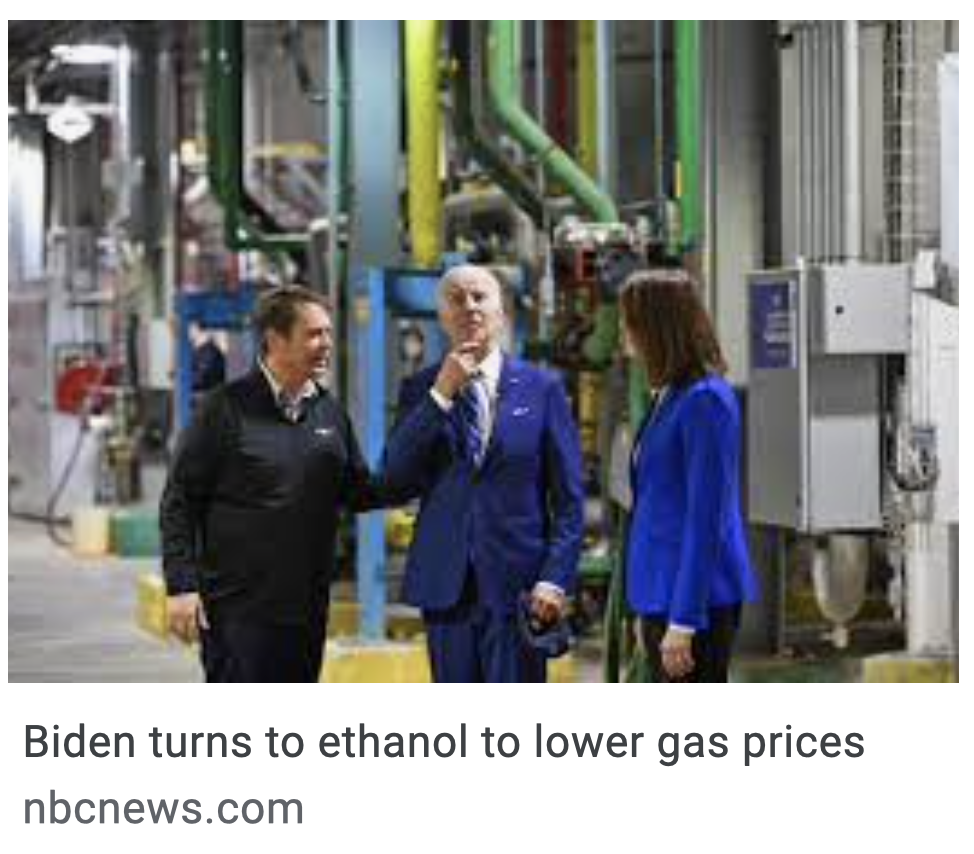As gasoline and food costs soar, Biden pours alcohol on the fire
/Biden lies, refiners die, and the media plays along
U.S. refiners will be on the hook for blending record volumes of ethanol and other renewable fuels into the nation's fuel supply this year, the Environmental Protection Agency said Friday.
The decision is a big win for the corn lobby and a setback for many refinery interests that say the requirements are too costly.
Ethanol (alcohol) contributes 30¢ a gallon to the price of gasoline, drives up the cost of corn, which in turn drives up the cost of poultry, beef, and pork, lowers MPG by 4-6 miles, and threatens to bankrupt the 67 small (under 75,000 barrels per day) refineries. So why is Biden doing this? Because, surprise! His corporate friends and Wall Street stand to make even more money than they already are from trading “RINs”.
First, a very brief explanation of what “RINs are:
Nearly 15 years ago, when we thought America was running out of domestic crude oil, Congress passed the Energy Policy Act of 2005 with the goal of decreasing imports, reducing greenhouse gas emissions and enhancing energy security. Among other provisions, the law mandated the blending of renewable fuels, such as corn-based ethanol, into gasoline and diesel. Known as the renewable volume obligation (RVO), and administered by the Environmental Protection Agency (EPA), this quantitative obligation has jumped from 12.9 billion gallons in 2010 to 19.9 billion gallons in 2019.
In addition, Congress directed the EPA to generate a system of tracking numbers, known as RINs (renewable identification numbers), to ensure that mandated blending requirements are being met by “obligated parties.” To make the process even more convoluted, the obligated parties are refineries and gasoline-diesel importers, not the parties doing the blending.
Therein lies a major problem. Most refineries do not actually blend fuel. So in order to meet their obligations, they must purchase excess RINs from third parties, typically big oil companies and large gasoline retailers with blending facilities. The RINs market is both opaque and highly volatile, at times generating huge profits for sellers while imposing significant costs on refiners and importers who must purchase them.
….
Two years ago, Philadelphia Energy Solutions, the largest refiner on the East Coast, cited the spiraling costs of RINs in its bankruptcy filing. As stated by former U.S. Energy Secretary Spencer Abraham, “The RIN system was not meant to create a multibillion-dollar commodity market that serves to subsidize large-scale blenders and vertically integrated oil companies at the expense of smaller and independent refiners.”
RINs: Collect ‘em, swap ‘em, trade ‘em with your friends!
Basically, the gi=overnment gives free RIN credits for each EV car manufactured. The big car makers get more than they need to offset the internal combustion cars, so they sell the excess to Wall Street and refiners. Tesla needs no offsets, of course, so the RINs are found money, to the tune of a billion-plus a year.
And so on. It’s government, as usual: lots of show, and lots of money for the favored few, while consumers and small businesses get screwed.
*Senator Ethanol” Chuck Grassley (Republican, Iowa) who lies about every single aspect of the stuff, claims that, because refining ethanol removes only the starch and leaves :distillers grain”, which can be used as cattle feed, there is no impact. I looked that up: “Distillers grain” raises feed costs between 15% if it’s dry, and 63%, wet. Grassley also claims that ethanol only uses corn that’s not eaten by humans, “so big deal”. I looked that up, too, although I already knew that sweet corn, the stuff you find on a cob or in the freezer department of your grocery store, is practically a novelty item: it comprises 1% of all corn grown, vs 99% for field, or “cow” corn.
I keep asking: if global warming is real, why do the advocates for the theory all lie about it?


